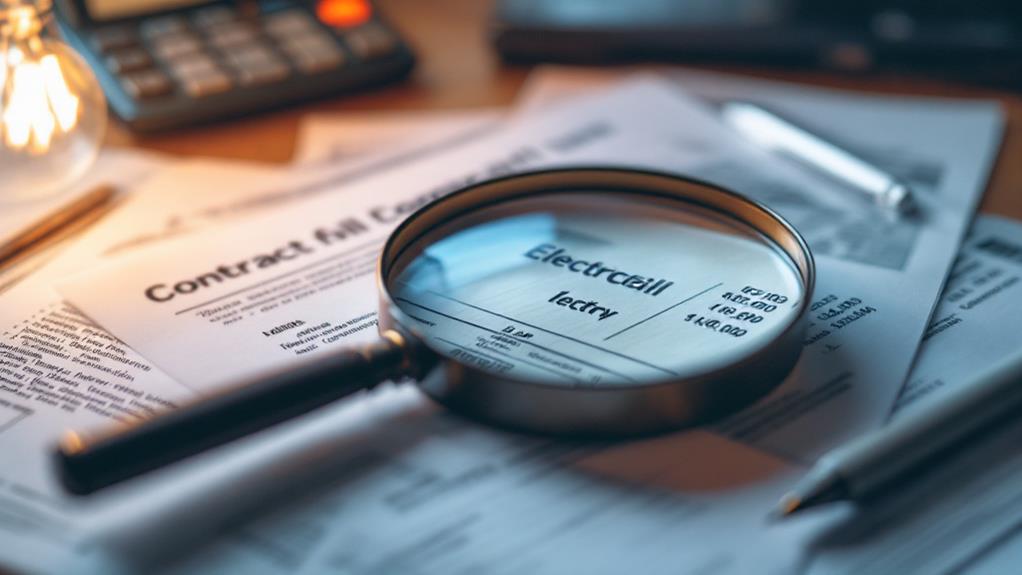Tips for Picking the Best Electric Power Provider: What to Consider

When choosing the best electric power provider, start by understanding your energy needs, considering factors like household size and seasonal usage trends. Compare pricing plans, such as fixed versus variable rates, and evaluate contract terms including any penalties or rate changes. Check the provider's reputation using customer reviews and ratings. Investigate their customer service for reliability and responsiveness. Don't forget to review billing practices and look out for hidden fees. Consider renewable energy options and incentives for extra savings. By examining these factors, you'll be well-prepared to make an informed decision and uncover more insights along the way.
Understand Your Energy Needs
To get started on choosing the right electric power provider, you need to investigate your own energy needs. Begin by examining your energy consumption over the past year. Look at your utility bills to identify trends and patterns. Are there certain months where your usage spikes? This could be due to seasonal changes, like increased heating in winter or air conditioning in summer. Recognizing these usage patterns helps you understand when your energy consumption is highest and lowest.
Next, consider any lifestyle changes that might impact your future energy needs. Are you planning to purchase an electric vehicle, or have you recently installed energy-efficient appliances? These factors can alter your consumption and should be accounted for when selecting a power provider. Furthermore, think about your household size and habits. Do you often work from home, or is your home typically vacant during the day? These details can influence your general energy usage.
Compare Pricing Plans
When comparing pricing plans, focus on finding one that aligns with your energy consumption patterns. Start by understanding the difference between fixed rates and variable rates. Fixed rates allow you to pay a consistent price per kilowatt-hour throughout your contract. This plan is ideal if you want stability and predictability in your monthly bills, especially if you're on a tight budget. You won't have to worry about price spikes when demand increases, giving you peace of mind.
On the other hand, variable rates fluctuate based on market conditions. They might start low, which can be tempting, but remember, they can rise unexpectedly, leading to higher bills. If you're comfortable with some risk and can adjust your energy usage when prices peak, a variable rate plan might suit you. It's essential to monitor market trends regularly if you opt for this plan.
To make the best choice, analyze your past energy bills and determine your monthly consumption patterns. Consider how changes in seasons or lifestyle might affect your usage. Armed with this information, you'll be better equipped to choose a plan that meets your needs and helps you save money.
Evaluate Contract Terms

Before you commit to any electric power provider, take the time to evaluate the contract terms thoroughly. Understanding the fine print can save you from unexpected surprises later. Initially, check the contract duration. Providers often offer varying lengths, from month-to-month to multi-year agreements. Decide what works best for your circumstances. A longer contract might lock in a lower rate, but it also means you're committed for that period.
Next, consider termination penalties. Life changes, and sometimes you need the flexibility to switch providers or relocate. If your contract includes hefty termination fees, this could become costly if you need to exit early. Ask about any conditions that might waive these penalties, such as a move out of their service area.
Also, be aware of any clauses that allow the provider to change rates during the contract duration. Some contracts might offer an attractive introductory rate that increases after a few months. Make sure you understand how and when rates can change. By evaluating these aspects, you can choose a contract that aligns with your needs and avoids unpleasant surprises down the road. Always read thoroughly and ask questions if anything is unclear.
Check Provider Reputation
Once you've got a handle on the contract terms, it's time to focus on the provider's reputation. A power provider's reputation can give you significant insights into their reliability and trustworthiness. Start by looking at provider ratings available on consumer review websites. These ratings often highlight the general satisfaction of current and past customers. Higher ratings typically indicate a provider that meets or exceeds customer expectations.
Next, explore customer reviews. These firsthand accounts can reveal detailed experiences that ratings alone might not capture. Pay attention to recurring themes in these reviews. Are there consistent complaints about billing practices or service interruptions? Or do most reviews praise the provider's reliability and transparency? The more consistent the feedback, the clearer the picture you'll get of what to expect.
Don't just skim over the reviews; read them thoroughly to understand the context behind each rating. Check multiple sources to confirm you're getting a balanced view. Sites like the Better Business Bureau or local consumer forums can offer supplementary perspectives. By carefully examining provider ratings and customer reviews, you'll make a more informed decision about which electric power provider best suits your needs.
Assess Customer Service

Evaluating customer service is crucial in choosing an electric power provider. You'll want a company that values your time and addresses your concerns efficiently. Start by checking their response times. When you have a question or an issue, you need prompt assistance. Providers who respond quickly reflect a commitment to their customers. Reach out to them with inquiries and see how they handle your request. Quick responses indicate a provider's dedication to service reliability.
Service reliability doesn't just refer to uninterrupted power supply; it also includes the dependability of their customer support. Reliable service means you'll consistently receive accurate information and solutions to your problems. Look for reviews or testimonials from current customers. They can offer insights into how the provider handles complaints, outages, and billing issues. These real-life experiences are invaluable in evaluating the quality of customer service.
Additionally, consider how the provider communicates with you. Do they offer multiple channels like phone, email, or chat? Having different communication options guarantees you can reach them in a way that suits you best. Prioritize electric power providers that make customer satisfaction a clear priority, guaranteeing your concerns are always addressed promptly and effectively.
Consider Renewable Options
When choosing an electric power provider, it is vital to contemplate renewable energy options. Embracing solar energy and wind power can greatly reduce your environmental impact and support a sustainable future. Look for providers that offer green certifications, which guarantee that a portion of their energy comes from renewable sources. These certifications confirm you're contributing to a cleaner environment while potentially lowering your carbon footprint.
Consider if the provider participates in community solar programs. These initiatives allow you to benefit from solar energy even if installing panels on your property isn't feasible. By supporting community solar, you're investing in shared renewable resources that improve energy efficiency for your entire neighborhood.
It's important to evaluate the energy efficiency measures promoted by potential providers. Some companies offer incentives or programs to encourage efficient energy use, ultimately saving you money while promoting sustainability. The more energy-efficient a provider's offerings, the better it is for the environment and your wallet.
Review Billing and Payments

Taking the time to dig into the billing and payment options of an electric power provider can save you from future headaches. Understanding how you'll be billed and how you can pay is vital to managing your finances effectively. Here's what you should focus on:
- Billing Cycles: Check if the provider offers monthly billing cycles that align with your budgeting habits. Some providers might offer bi-monthly or quarterly cycles, which could disrupt your financial planning if you're not prepared for larger, less frequent bills.
- Payment Methods: Verify the provider supports convenient payment methods that suit your lifestyle. Do they offer online payments, direct debit, or mobile app transactions? The more flexible the options, the easier it is to avoid late payments.
- Billing Transparency: Examine how transparent the provider is with their billing. Are there clear itemizations of charges? You'll want to confirm that each bill is easy to understand so you can track your usage and costs without confusion.
Investigate Additional Fees
Hidden costs can quickly turn a seemingly great deal into an unexpected financial burden when choosing an electric power provider. It's essential to investigate any supplementary fees that might not be immediately apparent. Some companies lure you in with attractive base rates, only to include hidden charges that inflate your bill. These can include service fees, late payment penalties, or charges for paper billing. Make sure you thoroughly review the terms and conditions and ask about any potential extra costs upfront.
Another aspect to watch out for is rate fluctuations. Some providers offer variable-rate plans where the price per kilowatt-hour can change based on market conditions. While this might seem advantageous during periods of low demand, it can lead to significant price hikes when demand spikes. Fixed-rate plans, on the other hand, offer stability and predictability, shielding you from sudden increases.
Explore Incentives and Discounts

Investigating incentives and discounts can considerably reduce your electricity costs. When selecting an electric power provider, you should look for incentive programs that they may offer. These programs can provide significant savings and rewards, making a noticeable difference in your monthly bill. Start by examining the provider's website or contacting their customer service to get a clear idea of what's available.
Here are three steps to reflect on:
- Identify Incentive Programs: Providers might offer rebates for energy-efficient appliances, solar panel installations, or smart thermostat usage. Knowing what's available will help you make the most of these opportunities.
- Determine Discount Eligibility: Some providers offer discounts for senior citizens, military personnel, or low-income households. Make sure to verify if you qualify for any of these discounts, as they can provide substantial savings.
- Compare Offers: Not all providers offer the same incentives. Compare different companies to see which ones have the most beneficial programs that suit your needs.
Don't overlook the potential savings from these programs. By taking a little time to investigate and understand your options, you can choose a provider that not only meets your energy needs but also offers financial benefits.



